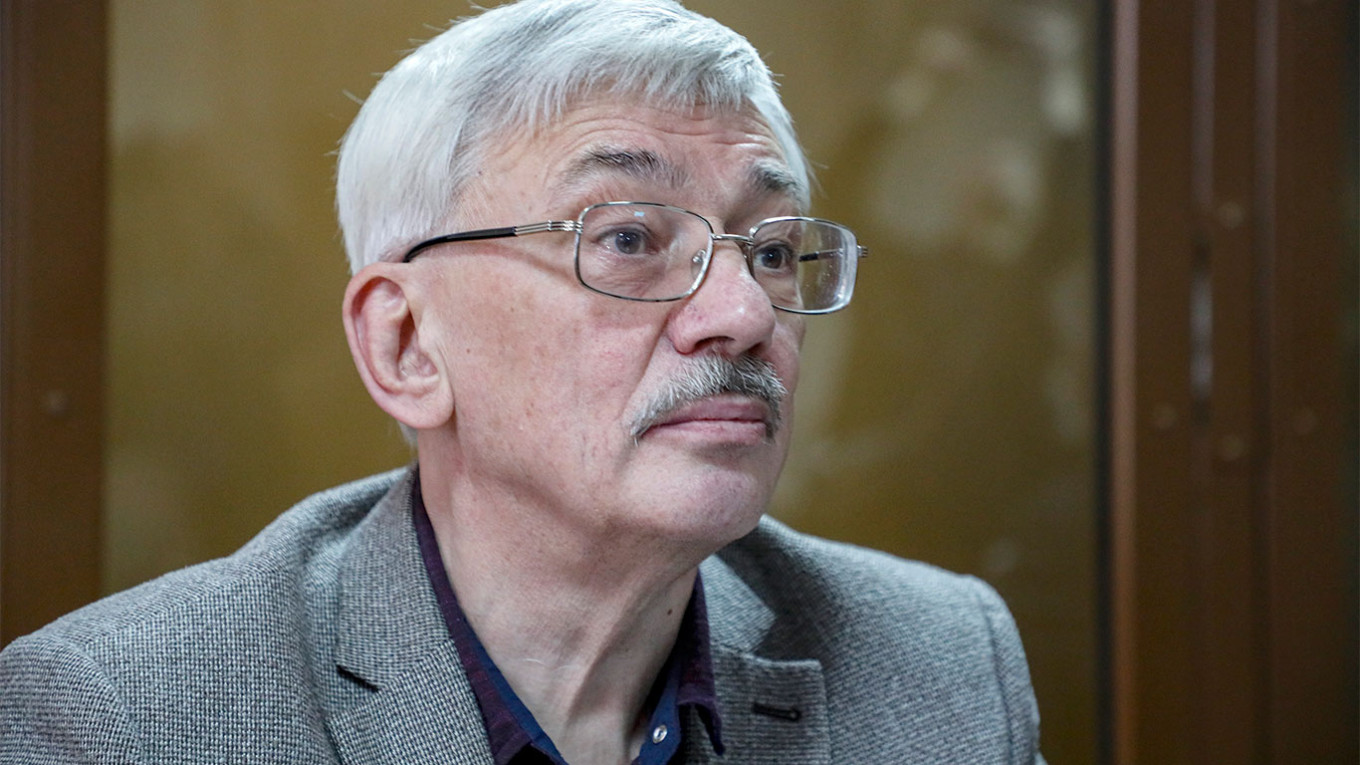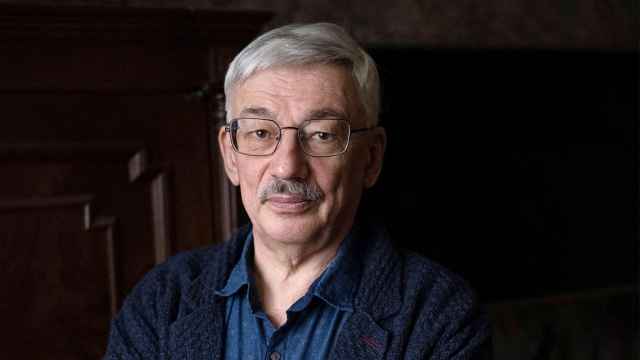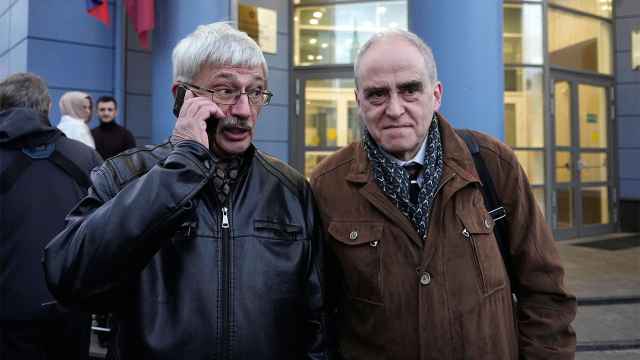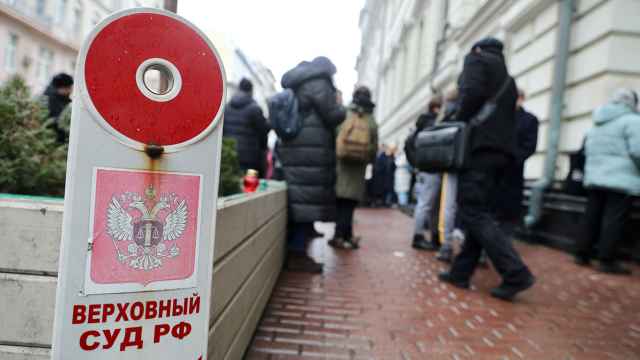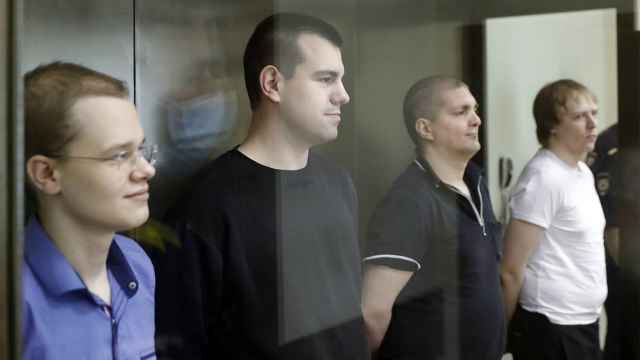Veteran Russian rights campaigner Oleg Orlov was fined 150,000 rubles ($1,500) on Wednesday on charges stemming from his public criticism of the invasion of Ukraine.
The 70-year-old co-chair of the Memorial human rights group is one of the few prominent anti-war voices to have remained in Russia following the invasion and to have not been jailed.
The Moscow Times has translated and republished his final word in court:
First, I would like to remind you that many of my like-minded individuals have been harshly punished: many years of imprisonment for their words, for peaceful protests, for the truth. Let's remember Alexei Gorinov and Vladimir Kara-Murza, who are currently being killed and placed in punitive isolation. Let's remember Alexandra Skochilenko, whose health is being deliberately undermined in the detention facility. Let's remember the seriously ill Igor Baryshnikov, to whom the court denied the right to attend his mother's funeral, and who is now effectively deprived of medical assistance. Let's remember Dmitry Ivanov, Ilya Yashin, and all those sentenced to long years of captivity for protests against the war.
Against this backdrop, the punishment that the prosecution is seeking for me seems extremely lenient. After all, in the end, paying such a small price for expressing a position that I consider to be the truth doesn't bother me. But no. In the event of any guilty verdict, we will appeal it. Because any guilty verdict, whether harsh or lenient, would be a violation of the Russian Constitution, a violation of the norms of the law, and a violation of my rights.
I do not repent!
I do not repent of participating in anti-war pickets and writing the article for which I am on trial. My previous life left me no other choice. I cannot help but recall the favorite motto of my teacher, the great human rights defender, Sergei Adamovich Kovalyov, a motto formulated by Roman thinkers: "Do what must be done, and be what will be."
I do not regret not leaving Russia. This is my country, and I believed that my voice would be louder from inside Russia. And now, thanks to the joint efforts of the political police, the investigation, the prosecutor's office, and the court, my modest newspaper article has received the kind of publicity I could only dream of.
And I don't regret working at Memorial for many years, working for the future of my country. Now it may seem like "everything has gone to hell." It may seem that everything I and my friends and colleagues have done has been destroyed, and our work was meaningless. But that's not the case. I am confident that it won't be long before Russia emerges from the darkness in which it is currently immersed. And this inevitability is to a considerable extent the achievement of the Memorial community and all our friends and colleagues in Russian civil society, which no one will be able to destroy.
So why did I participate in pickets and write this little article?
Today, the concept of a "patriot" is compromised. In the eyes of a vast number of people, Russian patriotism has become synonymous with imperialism. But for me and many of my friends, it's not like that. From my point of view, patriotism is primarily not pride in one's country but a burning shame for the crimes committed in its name. How ashamed we were during the First and Second Chechen Wars, and how ashamed we are now of what citizens of my country are doing in Ukraine on behalf of Russia.
German philosopher Karl Jaspers wrote a treatise in 1946, “The Question of German Guilt.” In this work, he formulated theses on the four types of guilt held by Germans after World War II: criminal, political, moral, and metaphysical. In my opinion, the thoughts outlined there are very much in line with our current situation as citizens of Russia in the 21st century.
I won't talk about criminal guilt now. Those who committed crimes will either be punished for it or not. But the future of present-day Russia (similar to the future of Germany in 1946) depends to a significant extent on whether all of us, without exception, are ready to reflect not on the guilt of others but on our own. Here's a quote from Jaspers' work:
"The phrase 'This is your guilt' can mean — you are responsible for the crimes of the regime you tolerated; this is our political guilt.
Your guilt is that you also supported this regime, participated in it — this is our moral guilt.
Your guilt is that you did nothing when crimes were committed nearby — here, metaphysical guilt is suggested."
In my opinion, people who love their homeland cannot help but think about what is happening to the country with which they feel an inseparable connection. They cannot help but think about their responsibility for what has happened. And in doing so, they cannot help but try to share their thoughts with others. Sometimes, there is a certain price to pay for this...
So, I tried.
Let me provide one more quote. This time from an official statement made on March 22 of this year.
"Russia and China call on all countries to promote such universal values as peace, development, equality, justice, democracy, and freedom, to engage in dialogue rather than confrontation."
This is stated on behalf of the state that sent its troops to the territory of a neighboring country, Ukraine, whose territorial integrity it recently recognized. On behalf of the state that is waging war there, qualified as aggression by the vast majority of UN member states.
This is stated on behalf of the state where all freedoms are suppressed, where laws that directly contradict the current Constitution are hastily adopted and actively enforced, laws that declare any critical expression a crime. Including the law under which you are now judging me.
Well, yes, "war is peace, freedom is slavery," and "Russian troops in Ukraine support international peace and security."
Dear court, isn't it obvious that all of us — you and I — now find ourselves in George Orwell's world, in his novel "1984"?
An amazing time loop!
In real history, rather than in literature, the year that followed 1984 would mark the beginning of change in the U.S.S.R.: perestroika, followed by the democratic revolution of 1991. Back then, it seemed like the changes were irreversible...
And now, more than 30 years later, we find ourselves in the year 1984...
Currently, there is no such thing as a "thought crime" in the Russian Criminal Code, and citizens are not punished for doubting the correctness of the state's policies, even if voiced in whispers in their own apartments. People are not punished for making the wrong facial expression. However, if someone expresses such doubts outside their apartment, there can be reports and punishment. Wearing clothing of the "wrong" colors is already subject to punishment. Publicly expressing a different opinion from the official standpoint is punishable. Sharing the views of international organizations is punishable. Expressing the slightest doubt in the accuracy of the Defense Ministry's official reports is punishable.
Under these circumstances, it is inevitable that a new law will be introduced in the future to punish thought crimes.
Currently, books are not burned in Russia's squares. However, books by authors who are not favored by the authorities are labeled with the humiliating tag "foreign agent." In bookstores, they are placed on distant shelves, and in libraries, they are issued to readers almost in secret. Actors who allow themselves to say something that does not align with the party's and government's line are being dismissed from theaters. The great actress Liya Akhedzhakova was removed from the profession for her civic stance. All of this is happening while the majority of those who were once called the "theatrical community" remain silent. In a totalitarian state, there should be no public, everyone should be afraid and keep silent.
Furthermore, I am immensely grateful to that community, those wonderful people who were not afraid and came to this trial, and who continue to attend other political trials. This is very important to me. Thank you very much!
Currently, what is happening is something that was unimaginable in Russia not so long ago, such as the arrest of director Zhenya Berkovich and playwright Svetlana Petreychuk. For what? For a play that reflects on the reasons why young women are pushed into terrorist organizations.
The established regime in Russia doesn't need people to think. What it needs are expressions as simple as bleating, and only in support of what the government currently proclaims as correct. The state not only controls the public, political, and economic life of the country, but it also seeks full control over culture and intrudes into private life. It is gradually becoming all-encompassing. This trend did not start on Feb. 24 of last year but was evident earlier. The war only accelerated this process.
How did my country, which had moved away from communist totalitarianism, slide into a new form of totalitarianism? What do we call this type of totalitarianism? Who is to blame for what has happened?
My little article, for which I am currently on trial, was dedicated to these questions.
I understand that there will be people who say, “There's nothing you can do, the law is the law. If a law is passed, it must be followed.”
I recall that in 1935, the so-called Nuremberg Laws were enacted in Germany. And later, after the victorious year 1945, those who enforced them were tried for their compliance.
I am not entirely certain that today's Russian enforcers of these anti-legal, unconstitutional laws will personally face judicial consequences. But punishment is inevitable. Their children or grandchildren will be ashamed to talk about where their fathers, mothers, grandfathers, and grandmothers served and what they did. The same will be true for those who are currently committing crimes in Ukraine in compliance with orders. In my opinion, this is the most severe punishment, and it is inevitable.
As for me, punishment is also inevitable since, under the present circumstances, a not-guilty verdict for such an accusation is impossible.
We will soon see what it will be.
However, I did not participate in the preparation of the law of the new Russia, on the rehabilitation of victims of political repressions, back in the 1990s for nothing. In the free Russia of the future, this law will definitely be expanded and amended to rehabilitate all current political prisoners, those convicted for political reasons, including those sentenced for their anti-war stance.
A Message from The Moscow Times:
Dear readers,
We are facing unprecedented challenges. Russia's Prosecutor General's Office has designated The Moscow Times as an "undesirable" organization, criminalizing our work and putting our staff at risk of prosecution. This follows our earlier unjust labeling as a "foreign agent."
These actions are direct attempts to silence independent journalism in Russia. The authorities claim our work "discredits the decisions of the Russian leadership." We see things differently: we strive to provide accurate, unbiased reporting on Russia.
We, the journalists of The Moscow Times, refuse to be silenced. But to continue our work, we need your help.
Your support, no matter how small, makes a world of difference. If you can, please support us monthly starting from just $2. It's quick to set up, and every contribution makes a significant impact.
By supporting The Moscow Times, you're defending open, independent journalism in the face of repression. Thank you for standing with us.
Remind me later.


